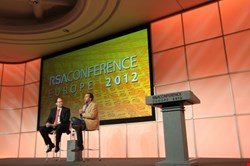
| Jimmy Wales talks to CNN about SOPA in January 2012 |
The topic of Wales’ comments centered on “Democracy and the Internet”, and the role that Wikipedia has played in the dissemination of information. Its significance in this process, as the sixth most popular destination on the web, has been profound from both a cultural and political perspective.
In fact, Wikipedia typically makes the list of top 10 sites in most regions, but not in China where the site was previously banned, as Wales recounted. “Virtually all of Wikipedia is accessible” in China, as he outlined, but certain content is filtered – mainly sensitive topics like the Tiananmen Square protests, Taiwanese independence and information on political dissidents.
Wales said that one of the most important issues, to him personally, is freedom of speech. “We are seeing the political impact of the internet on the world”, he added, things like communication tools that have given rise to various “revolutions” – whether they be ‘Facebook Revolutions’, ‘Twitter Revolutions’, or encryption tools that allow individuals to bypass government-sanctioned web filtering or remain anonymous while expressing political views via the medium. A primary example of this is the role of social media in this past spring’s political transformation known as the Arab Spring.
Even in established democracies with a lineage of free speech protections, privacy rights have a history of being infringed upon or subjected to uneven applications. So, in the case of a fledgling democracy such as those popping up in the Middle East, creating institutions that protect these rights, the rights of the individual, and their privacy is “non-trivial…even in the best cases”, Wales said.
Part of the mission of Wikipedia – and the internet as a whole – is to spread this information freely in the absence of any institutional safeguards, a mission the website’s founder takes seriously. “I will continue to support freedom of speech worldwide”, he told the audience. “I think it’s incredibly important.”
Even where free speech and privacy are engrained into a state’s institutions, as Wales alluded to, these concepts are still a matter of debate. A case in point, which he was all too happy to recap, was the proposed SOPA/PIPA legislation in the US. Wikipedia played an instrumental role in tabling the proposed legislation by raising awareness and taking the English-language version of the site offline for a day this past January.
“Our community fought against a bill that would have given unprecedented powers to the US government to block websites for allegations of copyright violation. The bill would have created a Chinese-style blocking system”, Wales insisted. “I am quite anti-piracy”, he added, noting that the online protest was not in favor of piracy, but a backlash against what he called “really bad legislation”.
He characterized the SOPA protest as not one of Silicon Valley vs. Hollywood, but rather one that sought to deny government the power to “arbitrarily shut down websites”, which the Wikipedia founder labeled as “dangerous to the health of the internet”. The battle to freely disseminate information without the threat of censorship continues in earnest, Wales pointed out.
Wales also promised to follow the proposed Communications Data Bill in the UK with a watchful eye. The proposal would require the retention of all electronic communications for the purpose of real-time access by law enforcement. Critics of the bill, however, have said it would amount to continuous “mass surveillance of innocent people”.
“It may, if it passes, be a positive impact, because it will be a completely useless bill that will push everyone to use HTTPS faster”, Wales predicted while expressing a somewhat contrarian view. He called the scheme “incredibly vague”, and was most concerned about the dangers associated with the archiving of all communications data by businesses. “It will be completely useless”, he contended, highlighting that many organizations – especially smaller ones and start-ups – will find it difficult to secure this data and therefore needlessly increase their risk of data leakage.